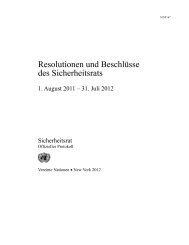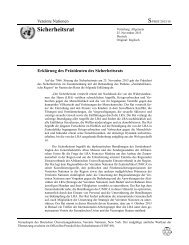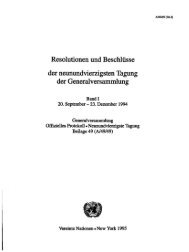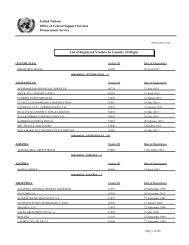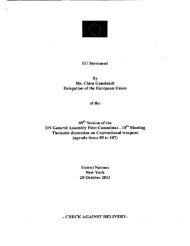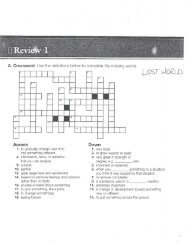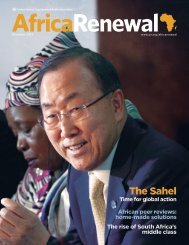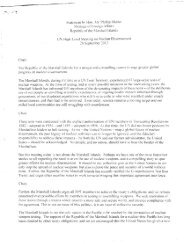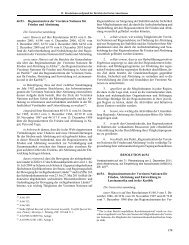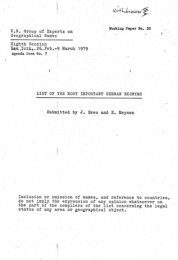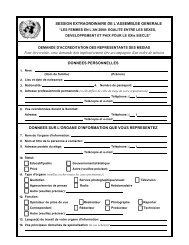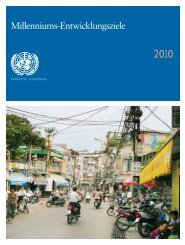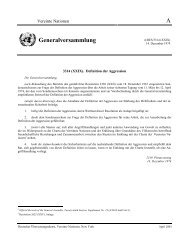- Page 1 and 2: OFFt OF LEGAL AFAmS COLLECTION OF E
- Page 3 and 4: Table of Contents Table des matiere
- Page 5 and 6: M THE ROLE OF THE LEGAL ADVISER IN
- Page 7 and 8: THE ROLE OF THE LEGAL ADVISER OR PR
- Page 9 and 10: PREFACE The world has changed radic
- Page 11: PROLOGO El mundo ha cambiado radica
- Page 15 and 16: THE ROLE OF THE LEGAL ADISER [N THE
- Page 17 and 18: decisions on matters of foreign pol
- Page 19 and 20: well as a great privilege. Assistin
- Page 21 and 22: ownership or, for the sake of more
- Page 23 and 24: GOVERNMENT OF GHANA RELATIVE TO THE
- Page 25 and 26: BETWEEN THE UNITED STATES OF AMERIC
- Page 27 and 28: "The Governments of the United King
- Page 29 and 30: torch-bearer for the decolonization
- Page 31 and 32: oppose independence. As you know, v
- Page 33 and 34: constantly kept on the agenda of th
- Page 35 and 36: Since independence, Ghana has pursu
- Page 37 and 38: In 1962, Nkrumah convened a confere
- Page 39: THE ROLE OF THE LEGAL ADVISER IN TH
- Page 43: the United States, are promoting th
- Page 46 and 47: Nous examinerons ainsi tout d'abord
- Page 48 and 49: apport positif pour l'6quilibre de
- Page 50 and 51: jurisconsulte est les r6actions et
- Page 52 and 53: ~aliste" 6 ou objedfif . Evalu6e du
- Page 54 and 55: jurisconsulte b6n6ficie de son r6le
- Page 56 and 57: Le r6le de conseiller du jurisconsu
- Page 58 and 59: de recourir i la m~thode de ligne d
- Page 60 and 61: de la proposition et 26 Etats contr
- Page 62 and 63: protagonistes ont dfi faire de gran
- Page 64 and 65: Le choix du mode de r~glement du di
- Page 67 and 68: THE ROLE OF THE LEGAL ADVISER IN TH
- Page 69 and 70: This article attempts to illustrate
- Page 71 and 72: "intervene" in the conclusion of an
- Page 73 and 74: function of the political departmen
- Page 75 and 76: At this stage, the proposal must al
- Page 77 and 78: These ministers may, however, do so
- Page 79 and 80: The legal adviser has to decide how
- Page 81: conclusion of treaties and their ap
- Page 84 and 85: II. International Humanitarian Law
- Page 86 and 87: for human rights started as a liber
- Page 88 and 89: on the similarities between the two
- Page 90 and 91:
protection to the human person". In
- Page 92 and 93:
(ICTY)" 7 and of the International
- Page 94 and 95:
two notions of this threshold cumul
- Page 96 and 97:
the Court. This provides, for insta
- Page 98 and 99:
D~s 1950, la Convention europ6enne
- Page 100 and 101:
collectifs. Presque tous ses membre
- Page 102 and 103:
~gle g6n6rale il s'agit de jugement
- Page 104 and 105:
nationales puis de n6gociation aien
- Page 106 and 107:
en cause sont tr~s varies mais reve
- Page 108 and 109:
la rigueur et de la pugnacit6 dont
- Page 110 and 111:
denominators of the different legal
- Page 112 and 113:
The legal advisers' meeting normall
- Page 114 and 115:
access to the Minister of Foreign A
- Page 116 and 117:
monitoring of the work of the offic
- Page 118 and 119:
oad publicity, including those on t
- Page 120 and 121:
particular international commitment
- Page 122 and 123:
It is sometimes said that the role
- Page 124 and 125:
These are examples of efforts to no
- Page 126 and 127:
an increasing importance in the rel
- Page 128 and 129:
c) Register treaties for national t
- Page 130 and 131:
e) Appear before bodies established
- Page 133 and 134:
SOFT LAW AND THE LEGAL ADVISER Hart
- Page 135 and 136:
We should also differentiate betwee
- Page 137 and 138:
interests.' The wholesale criticism
- Page 139 and 140:
said in its 1950 advisory opinion o
- Page 141 and 142:
Non-treaty agreements are concluded
- Page 143 and 144:
sovereign will of the declaring Sta
- Page 145 and 146:
parties be introduced without the a
- Page 147 and 148:
treaty breaches to a more complex v
- Page 149 and 150:
about the rules inherent in the agr
- Page 151 and 152:
In any event, pledges are to be ful
- Page 153 and 154:
internal door for the other side to
- Page 155 and 156:
international law may be inadmissib
- Page 157 and 158:
THE ROLE OF THE LEGAL ADISER IN THE
- Page 159 and 160:
multilateral conventions for Bosnia
- Page 161 and 162:
agreed The same article goes on to
- Page 163 and 164:
L Practice of the Republic of Croat
- Page 165 and 166:
Croatia- A few States, however, did
- Page 167 and 168:
The legal adviser played a paramoun
- Page 169 and 170:
scrutinized by the Ministry of Just
- Page 171 and 172:
on a list of the treaties which are
- Page 173:
practising lawyers, interested firm
- Page 177 and 178:
L' HABILITATION LEGISLATIVE: UN MOY
- Page 179 and 180:
ne peut etre op&e que par l'entremi
- Page 181 and 182:
. Ces textes sont ensuite appliques
- Page 183 and 184:
Pamin ces r~sohumons, celles qui im
- Page 185 and 186:
Mais le D13partement juridique joue
- Page 187 and 188:
THE ROLE OF AND PROBLEMS CONFRONTED
- Page 189 and 190:
the federal Government or any treat
- Page 191 and 192:
is not possible. For example, any m
- Page 193 and 194:
which the obligations incurred are
- Page 195 and 196:
understood in Islam. Rules of prude
- Page 197 and 198:
THE ROLE OF THE LEGAL ADVISER IN TH
- Page 199 and 200:
3. Post-Federation Both before and
- Page 201 and 202:
the prevailing State practice. 5 IV
- Page 203 and 204:
contend with the problem of success
- Page 205 and 206:
ilateral treaties were allowed to l
- Page 207 and 208:
officers and issued in the form of
- Page 209 and 210:
Given the common law and constituti
- Page 211 and 212:
have been rare and have not operate
- Page 213 and 214:
no doubt avail opportune moments fo
- Page 215 and 216:
TREATY NEGOTIATION AND THE NATIONAL
- Page 217 and 218:
However, the specialist role of the
- Page 219 and 220:
The i-actice prevailing in Sri Lank
- Page 221 and 222:
the political tensions which had do
- Page 223 and 224:
establishing the World Trade Organi
- Page 225 and 226:
The Coordinating Committee comprise
- Page 227 and 228:
Convention on International Trade i
- Page 229 and 230:
transfer of technology, this was on
- Page 231:
committees, to ensure that the deci
- Page 234 and 235:
que los instrumentos intemacionales
- Page 236 and 237:
especto del proceso legislativo y l
- Page 238 and 239:
una parte importante de los delegad
- Page 240 and 241:
uno de los cuales podria ser las di
- Page 242 and 243:
con cl conocimiento de la doctrina
- Page 244 and 245:
V. El Asesoramiento del Consejero L
- Page 246 and 247:
Ademis del asesoraniento institucio
- Page 248 and 249:
Legal est6 conformada por funcionar
- Page 250 and 251:
ecordar que en la Cancilleria argen
- Page 252 and 253:
En este contexto, el consejero lega
- Page 255 and 256:
TIE ROLE OF THE LEGAL ADVISER IN CO
- Page 257 and 258:
objectMs concerned the question of
- Page 259 and 260:
and thus been clear about the legal
- Page 261 and 262:
This means that the Socialist Feder
- Page 263 and 264:
not insisted on raising the questio
- Page 265 and 266:
Having in mind this experience, I b
- Page 267 and 268:
subject matter of a dispute between
- Page 269:
developed so that any proposed deci
- Page 272 and 273:
ainsi trouv6 en premiere ligne dans
- Page 274 and 275:
De mani~re intuitive on pergoit bie
- Page 276 and 277:
m6riter ce nom, dans le domaine jur
- Page 278 and 279:
dapression qui, au lieu du progr~s
- Page 280 and 281:
d~signis par la r6gion pour singer
- Page 282 and 283:
initiative de la Fd~ration Syndical
- Page 284 and 285:
du BIT avait fait observer dans son
- Page 286 and 287:
Peut-on pour autant parler d'invent
- Page 288 and 289:
instruments inadaptds a la ratifica
- Page 290 and 291:
Comme on l'a indiqu6 en introductio
- Page 292 and 293:
Commission de la fonction publique
- Page 294 and 295:
Le survol qui precede comporte une
- Page 297 and 298:
THE ROLE OF THE LEGAL ADVISER OF AN
- Page 299 and 300:
institUtional one and is, according
- Page 301 and 302:
member did not pay any taxes on his
- Page 303 and 304:
pubidy know., But now, as to my oth
- Page 305 and 306:
Question 3 - Do you have a role to
- Page 307 and 308:
TU, most of the legal "material" pr
- Page 309 and 310:
for the reasons of this change, I w
- Page 311 and 312:
and is followed by the said 20 subp
- Page 313 and 314:
isk of rejection, as I was heavily
- Page 315 and 316:
finctioning and practice in various
- Page 317 and 318:
Question 9- What qualifications are
- Page 319 and 320:
Morage uad a thii* skin, all needed
- Page 321 and 322:
Z 0 za 3 A a ac ~cu1 0o Am= 2 ! --I
- Page 323 and 324:
the Member States and other interna
- Page 325:
preferably of the UN Common System.
- Page 328 and 329:
* Certifying to the Bank's underwri
- Page 330 and 331:
incumbent is concerned. This is due
- Page 332 and 333:
Agreement has followed the latter c
- Page 334 and 335:
influenced by the political charact
- Page 336 and 337:
information indicates that the disp
- Page 338 and 339:
Assignments of lesser importance ha
- Page 340 and 341:
as agreed with the borrower. The pr
- Page 342 and 343:
encourage and extend, as appropriat
- Page 344 and 345:
his report that: "Whereas in the pa
- Page 346 and 347:
These questions will be addressed b
- Page 348 and 349:
Yaound6 General Conference during t
- Page 350 and 351:
some delegations, both informally a
- Page 352 and 353:
Organization Administrative Tribuna
- Page 354 and 355:
udget, while the operational budget
- Page 356 and 357:
as its administrative regulations a
- Page 358 and 359:
pursuing the reform process of UNID
- Page 360 and 361:
The wording of this paragraph testi
- Page 362 and 363:
formulation and implementation, and
- Page 365 and 366:
THE LEGAL ADVISER AND LITIGATION IN
- Page 367 and 368:
H. The Australian Context Before tu
- Page 369 and 370:
ule is if there is little material
- Page 371 and 372:
In Australia, the position of natio
- Page 373 and 374:
of treaty provisions. The willingne
- Page 375 and 376:
esponsibility and interests of a fa
- Page 377 and 378:
Some judges refer to the Bangalore
- Page 379 and 380:
equire many years of effort, educat
- Page 381 and 382:
developments prohibiting discrimina
- Page 383 and 384:
Social and Cultural Rights (ICESCR)
- Page 385 and 386:
Nicaragua v. United States ofAmeric
- Page 387:
VI THE ROLE OF THE LEGAL ADVISER OR
- Page 390 and 391:
de la Cour et de recevabilit6 d'une
- Page 392 and 393:
force des choses, pr6sente ces sour
- Page 394 and 395:
fagon dont les plaideurs et conseil
- Page 396 and 397:
constitu6e par la narration argumen
- Page 398 and 399:
Projet Gabdkovo-Nagymaros", ils con
- Page 400 and 401:
peuvent 8tre consid6r~es comme obli
- Page 402 and 403:
1'essence de la r~gle. Tels, par ex
- Page 404 and 405:
prend alors un certain ascendant. C
- Page 406 and 407:
27. Les principes g~nraux du droit
- Page 408 and 409:
obligations assum6es par les Etats
- Page 410 and 411:
I. Les fonctions du Chef du Service
- Page 412 and 413:
Implicitement, il d~coule toutefois
- Page 414 and 415:
conununautaires", D'apris une analy
- Page 416 and 417:
i'neure actuele, ia premere pnase a
- Page 418 and 419:
apport qui est transmis au comite d
- Page 420 and 421:
La port6e de l'obligation d'ex~cuti
- Page 422 and 423:
Nous avons d~ji mentionn6 la procha
- Page 424 and 425:
jurisprudence dans le cadre des sys
- Page 427 and 428:
INTERNATIONAL LITIGATION AND PEACEF
- Page 429 and 430:
has finally failed." 3 The present
- Page 431 and 432:
control of Nauru in 1942 and subjec
- Page 433 and 434:
sovereign nation"." Because of the
- Page 435 and 436:
that it had total freedom of action
- Page 437 and 438:
Optional Clause declarations. Formu
- Page 439 and 440:
for Nauru; he was so addressed by t
- Page 441 and 442:
joint letter of discontinuance of I
- Page 443 and 444:
name. Australia and its other two f
- Page 445:
feasibility studies. Post-judgment
- Page 448 and 449:
des conseils et avocats 3 dans la p
- Page 450 and 451:
certainement rassurant" et pour les
- Page 452 and 453:
Ce barreau officieux est toutefois
- Page 454 and 455:
6quilibre g~ographique raisonnable,
- Page 456 and 457:
partie 3 et qui effectue en son nom
- Page 458 and 459:
En dehors de ce noyau incompressibl
- Page 460 and 461:
mime r~ellement l'affaire en mains
- Page 462 and 463:
certain qu'une th~orisation soit po
- Page 464 and 465:
thbses respectives). Le r6le des co
- Page 466 and 467:
s'abstient de guider les Parties en
- Page 468 and 469:
fLhx en raison de circonstances tr~
- Page 470 and 471:
plan institutionnel; il restera ceu
- Page 472 and 473:
Federal States of Micronesia in the
- Page 474 and 475:
countries having such libraries at
- Page 476 and 477:
the ideal candidate for ad hoc judg
- Page 478 and 479:
specialists, who -- at least for th
- Page 480 and 481:
(1982)12, Libya (1982)13, Libya (19
- Page 482 and 483:
Iran (1996)," Hungary (1997), " Slo
- Page 484 and 485:
Nicaragua (1986)," 3 Guinea-Bissau
- Page 486 and 487:
that their expertise in certain con
- Page 488 and 489:
tendencies (to the point of almost
- Page 490 and 491:
paper.
- Page 492 and 493:
It was agreed in article 3 of the A
- Page 494 and 495:
In any democratic State, institutio
- Page 496 and 497:
computers. The importance of confid
- Page 498 and 499:
originals of any annexed documents
- Page 500 and 501:
produce many of the charts and tabl
- Page 502 and 503:
simultaneous interpretation from En
- Page 504 and 505:
VII. Summary Many valuable lessons
- Page 507 and 508:
BETWEEN COMMITMENT AND CYNICISM: OU
- Page 509 and 510:
I will call "cynicism". I shall aim
- Page 511 and 512:
gains in one's ability to lead a li
- Page 513 and 514:
empirical reality or moral discours
- Page 515 and 516:
ambiguity. The debate about a "legi
- Page 517 and 518:
And is there not something of high
- Page 519 and 520:
structures of sovereignty and treat
- Page 521 and 522:
1'on entend bien revendiquer pour s
- Page 523 and 524:
The policy-science approaches that
- Page 525 and 526:
The judge personifies impartiality,
- Page 527 and 528:
In other words, comrmitment to rule
- Page 529 and 530:
From the internal perspective of th
- Page 531 and 532:
Court's non liquet in the Nuclear W
- Page 533 and 534:
Court of Justice -- arrives at a co
- Page 535 and 536:
Hence the academic, too, is always



